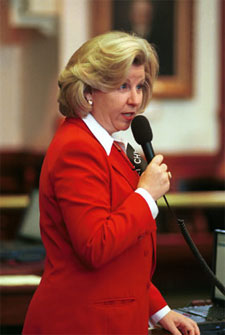 Nelson: ‘... people will think twice about abusing the system if records are public.’ (www.senate.state.tx.us)
Nelson: ‘... people will think twice about abusing the system if records are public.’ (www.senate.state.tx.us)
|
|
‘The public has a right to know about misuse of their tax dollars.’
|
 South Texas Dental agreed to pay a $5 million settlement, but reasons why were sealed. (Photo by Scott Latham)
South Texas Dental agreed to pay a $5 million settlement, but reasons why were sealed. (Photo by Scott Latham)
|
|
A D V E R T I S E M E N T
|
|
|
|
A D V E R T I S E M E N T
|
|
Reopening Records of Abuse
A North Texas senator is trying to make
social-service agency investigations public again.
By Pablo Lastra
When Fort Worth Weekly investigated allegations of Medicaid fraud and dangerously poor care provided by some discount dental clinics in Texas (“Dental Anguish,” Nov. 3, 2004), it learned that South Texas Dental, the state’s largest provider of dental services to the poor, had reached a $5 million settlement with the state for “inappropriate practices and billings,” following a three-year investigation.
However, when the Weekly filed an open-records request with the state Health and Human Services Commission asking for details of the settlement and investigation, it hit a bureaucratic wall. The HHSC indeed sent a copy of the settlement, but almost all information in it had been deleted. And the agency refused to release any information on the investigation itself, citing an obscure statute as the reason for both the redactions and the denial of records.
As the basis for its actions, the agency cited a little-known provision in the huge House Bill 2292, which two years ago redrew the landscape of social services in Texas, merging 11 different state agencies into four overseen by a single governor-appointed commissioner.
Many provisions of HB 2292 are still causing controversy. Consumer groups and open-records advocates are criticizing the section that essentially wiped out public access to records about fraud investigations of companies, ranging from dental providers to nursing homes, that receive Medicaid money through the HHSC.
Now State Sen. Jane Nelson of Lewisville has introduced a bill to re-open most of those records. “The public has a right to know about misuse of their tax dollars, especially when it comes to fraud and abuse,” she said in an e-mailed statement. “Fraud in the Medicaid system robs needy families of services, and I think people will think twice about abusing the system if they know these investigations will become public information.” The bill, currently in committee, would make the HB 2292 restrictions not applicable to the files of completed investigations.
Rep. Dan Gattis, the Georgetown Republican who wrote the amendment to HB 2292 that closed off the records, did not return calls from the Weekly, but he has told other reporters that the HHSC is wrongly interpreting the law. Gattis said that wholesale closure of records was never his intent, that he meant it to apply only to ongoing investigations. However, the law as written makes no such distinction. It says that “All information and materials compiled by the office [of the inspector general of HHSC] in connection with an investigation are confidential and not subject to disclosure.”
In the copy of the South Texas Dental settlement received by the Weekly, all the allegations and findings that resulted in the settlement were redacted. All that was left were a few paragraphs defining parties and penalties and noting that, “due to the uncertainty of litigation, the Provider [South Texas Dental] agrees to the terms set forth in this agreement.”
Joe Larsen, director of the Freedom of Information Foundation of Texas, examined the Weekly’s original request for information on the settlement and the attorney general’s office ruling. He said the allegations and the investigators’ findings should be made public because the inquiry is now completed.
“In this instance, the public’s interest in knowing the disposition of the case trumps the purpose of the confidentiality of what is essentially a completed investigation,” he said.
Larsen said that such settlement agreements involving the government are specifically mentioned in the state open-records code as not exempted from disclosure. “The allegations in the settlement agreement are of a ‘we say, they say’ nature,” he said. “They contain no material information from the investigation itself.”
Larsen said that while he could see the reasoning behind the law — to prevent a party being investigated from gaining access to information during the investigation — “seemingly innocuous language can be used to restrict the public’s access to information.”
Nelson said that people who had had experiences similar to the Weekly’s motivated her to file the bill. “It came to my attention that these barriers existed in obtaining information about fraud in the Medicaid system, which is absolutely something that we need to ensure is public record,” she said. “Government is supposed to be for the people and by the people, and that is why there should be as much openness as possible.”
Consumer advocacy groups agree that the law as it currently stands deprives the public of critical access to information.
Cathy Mitchell of Consumers Union of Texas said that Nelson’s bill is a “very good first step,” but that even the corrected version of the law would be too restrictive.
“As it is, the law makes no distinctions between ongoing and completed investigations. Investigations from 15 years ago and investigations in the future all become confidential under this statute,” she said. “But I’m still very concerned about the wording ‘all information and material compiled.’ That could include any piece of information that showed up in their office and became part of a compilation.”
Mitchell said that, for example, even statistical information about fraud could be considered not subject to disclosure.
“It’s critical to public accountability that there are provisions to release some fraud enforcement info,” she said. “We still need the word ‘compiled’ limited in some way.”
Since the Weekly wrote about South Texas Dental and its 19-clinic operation in November, the HHSC Office of the Inspector General has also reached a settlement with Castle Dental, another dental clinic chain. In November, Castle Dental agreed to repay $200,000 to the state and pay a fine of $3,000 in order to avoid litigation.
According to the HHSC, Castle Dental had been “offering reduced prices to the general public for specific dental services while continuing to bill Medicaid for the maximum reimbursement rate for Medicaid clients for the same services.” Castle Dental’s web site says that the Houston-based company “has enjoyed explosive growth” in recent years, going from 42 clinics in 1997 to more than 100 locations in four states in 2004.
Other groups continue to battle other provisions in HB2292. State employee unions, for example, are incensed that it requires the closure of local services eligibility offices. State residents who needed help in applying for health programs are supposed to be directed to a call center, which will result in the elimination of about 3,000 jobs.
 Email this Article...
Email this Article...

